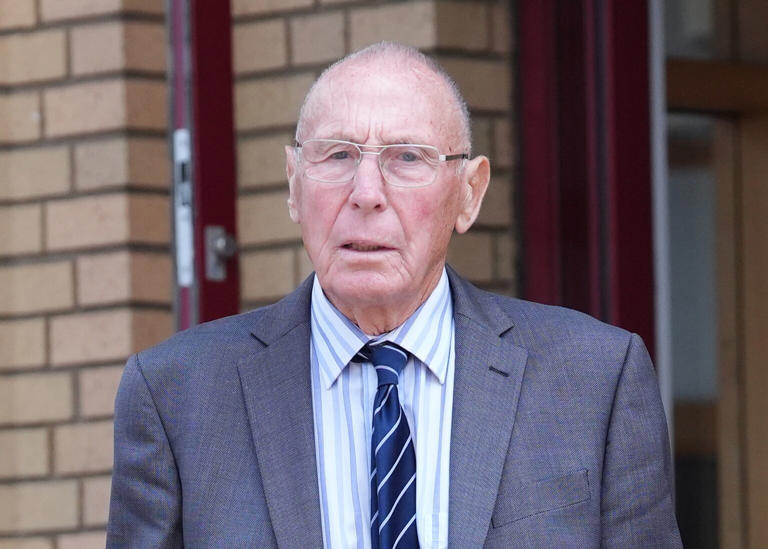For many parents, watching their child achieve greatness is a source of lifelong joy.
For Geoff Thorpe, the father of late England cricket icon Graham Thorpe, that pride is now bittersweet.
Even after his son’s tragic death, Geoff finds comfort in replaying old cricket footage—reliving the brilliance of Graham’s cover drives and clever shot placement.
But beneath the nostalgia lies a deep sorrow: Graham took his own life, and an inquest has confirmed that serious gaps in mental health care contributed to that loss.
A Life Lost Too Soon
Graham Thorpe passed away on August 4, 2023, after being struck by a train.
Last week, a three-day inquest concluded his death was a suicide.
The investigation also revealed that Graham had been badly let down by the medical professionals and mental health services that were supposed to support him during his darkest moments.
This Friday would have marked Graham’s 56th birthday.
To honour his memory, a tribute called A Day for Thorpey will take place at The Oval during England’s fifth Test against India.
Fans will see his signature headbands on sale, with proceeds going to Mind, the mental health charity, aiming to expand their Bat and Chat community cricket programme.
A Father’s Loving Memories
Geoff Thorpe, now 83, shared with The Telegraph how he keeps his son’s memory alive.
“I love watching him bat,” he said.
“Those cover drives, the pulls—I’ve got this one video from the Benson & Hedges Cup where he scored a hundred.
David Lloyd was commentating, saying ‘Watch his eyes—he’s looking at the gaps,’ and sure enough, that’s exactly where the ball went.”
Even though pride fills his voice when he recalls Graham’s career, Geoff doesn’t hide the emotional toll his son’s death has taken.
“You feel this grief creep in. Sometimes, as men, we act tough, thinking we’re handling it—but we’re not,” he admitted.
“I still visit his grave, and I have my moments. Then I try to keep busy. That’s all I can do.”
A Downward Spiral After Coaching Setback
Graham’s mental health struggles worsened significantly after he was let go from his role as England’s assistant coach following the 2021-22 Ashes series in Australia.
According to his family, he showed classic signs of depression—losing weight, lacking energy, withdrawing from loved ones, and feeling hopeless about the future.
Despite these red flags, his attempts to access support often led nowhere.
His wife Amanda explained during the inquest that Graham had become deeply affected by Covid lockdowns and the emotional fallout from losing his job.
“He told me he didn’t want to be here anymore,” she said tearfully.
“He asked me to help him end his life. I didn’t know what to do—I was completely torn.”
A Battle With Mental Health Long Before the End
Graham had first been diagnosed with depression and anxiety in 2018, and things only got worse during the pandemic.
The pressure intensified after a late-night video of him was leaked online.
Although he took full responsibility and personally apologised to the players and staff, the shame stayed with him.
In April 2022, Graham attempted to take his own life.
He remained unconscious for three weeks and spent more than a month in intensive care.
Following this incident, the expectation was that he would receive closer support.
Unfortunately, that didn’t happen.
Care System Criticised for Failing to Act
The inquest revealed disturbing gaps in the medical care provided to Thorpe.
Over the final four-and-a-half months of his life, he wasn’t seen once by the psychiatrist assigned to him.
He only had two appointments in total with his local support team, despite openly expressing suicidal thoughts multiple times.
Jessica Harris, his previous care coordinator, had built a solid relationship with Graham.
She often visited him at home if he wasn’t up for leaving the house.
But when she left the service in February 2024, Graham’s engagement with the mental health team dropped dramatically.
Final Warnings Ignored
Her replacement, Katie Johnson, had a sobering conversation with Amanda Thorpe on June 28.
She recorded that Graham’s mental health had deteriorated further.
Amanda reported that he wouldn’t get out of bed and had become fixated on ending his life, even discussing traveling to Switzerland for assisted suicide.
Still, these signs weren’t flagged as emergencies.
When pressed at the inquest, the psychiatrist Dr. Baheerathan argued that Graham’s comment about Switzerland was “just a thought” and not a concrete plan.
However, Ms Johnson interpreted it differently—she felt Graham was expressing a genuine intent to die.
Despite this, his next scheduled mental health appointment was set for August 9.
He died five days earlier.
A Legacy Carried Forward Through Cricket
Despite the pain of losing him, Graham’s legacy continues—on the field and beyond.
He represented England in 100 Tests and 82 One Day Internationals between 1993 and 2005.
His graceful left-handed batting style left a lasting imprint on English cricket.
At The Oval this Friday, fans will not only remember Graham’s talent but also support a vital cause.
The funds raised through the sales of his trademark headbands will go toward Mind’s Bat and Chat sessions—bringing community, conversation, and cricket together to support those facing mental health battles.
A Call for Better Support
Graham’s tragic story sheds light on the urgent need for improved mental health services, especially for those dealing with the weight of public scrutiny and personal failures.
As his father, wife, and daughters grieve, they also carry forward a message: Mental health care must be proactive, compassionate, and consistent.
As Geoff put it so simply, “This mental health… it’s a big, big problem. It smothers you if you don’t talk.”
His hope—and the hope of everyone touched by Graham’s story—is that no more lives will be lost to silence.
